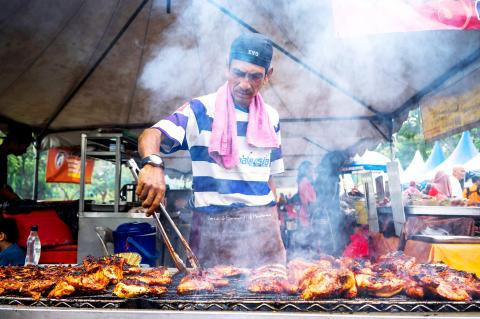Jonathan Waxman was a Berkeley, California hippy who fell into the restaurant trade, running the kitchens at Alice Waters’s Chez Panisse in the late 1970s and palling around with culinary rock-stars like Jeremiah Tower and Michael McCarty. Together they brought a relaxed, ingredient-focused sensibility to eating that came to be known as “California cuisine.”
Waxman’s seminal restaurant Jams closed in the ‘80s, but he kept in the game. He’s been running the more Italian-focused Barbuto in New York’s West Village since 2004 and last year opened Adele’s in Nashville, Tennessee, which is named after his mother and features a giant wood-burning oven at its center. He’s become the gentle grandfather of a new generation of chefs. As he prepares to reopen Jams in 1 Hotel Central Park this month, another Adele’s in Toronto and a possible return to his home turf in San Francisco, Bloomberg Brief’s Peter Elliot caught up with him at Barbuto.
Peter Elliot: You’re a grilling master. What’s the best advice for home grillers??

Photo: Bloomberg
Jonathan Waxman: Don’t get the fire too hot or too low. Fill the chimney up, get it hot and dump it out, then add fresh coals immediately. Number two, if you’re using a gas grill everyone turns it on too full and that just makes for [food] fires. Or they turn it way too low because they are afraid. So, medium on a gas grill.
PE: Your rule on gas vs charcoal?
JW: Never use gas and only use charcoal. I recommend a Weber-style kettle grill. That’s all you need.
PE: And what’s your grilling technique?
JW: Let’s say you want to do steak and potatoes; keep it simple. The trick is to wrap the potatoes and throw them in the bottom where the coals are — but double wrap them with tinfoil so they don’t get burnt. Then you can grill the steaks after about 20 minutes. Here’s the trick: make sure when you grill them you’re doing that over the hot parts of the coals. If it’s not hot you have to push the coals to one part of the grill to really get intense heat. Grill the steaks 75 percent on one side. Everyone wants to flip their meat back and forth, but put it in one place and forget about it. It’s important for chicken, it’s important for fish, it’s important for vegetables. Seventy- five percent.
PE: The Waxman 75/25 rule, I like it. What about the rest of the meal?
JW: When you want to get ready for your meal, you want to get everything ready at the same time. Let’s say your potatoes are done, you pull them out and your steak feels a little rare to you, put some fresh coals on, get the potatoes ready, get your salad ready, get the wine ready, throw the steaks on for two minutes a side to reheat them and you’re good.
PE: Explain the transition from being the father of “California cuisine” to Adele’s in Nashville and Mr Barbecue.
JW: Four years ago this rock and roller, Caleb Followill [Kings of Leon lead singer] started coming into Barbuto a lot. One day we started talking about rock and roll, food, everything. We got to be very good friends. One day he looks at me and asks “How come I can’t get this food in Nashville?” I said, “Well let’s do something about it.” He’s represented by Ken Levitan who’s one of my partners and I have other amazing partners who are local Nashvillians.

In Taiwan there are two economies: the shiny high tech export economy epitomized by Taiwan Semiconductor Manufacturing Co (TSMC, 台積電) and its outsized effect on global supply chains, and the domestic economy, driven by construction and powered by flows of gravel, sand and government contracts. The latter supports the former: we can have an economy without TSMC, but we can’t have one without construction. The labor shortage has heavily impacted public construction in Taiwan. For example, the first phase of the MRT Wanda Line in Taipei, originally slated for next year, has been pushed back to 2027. The government

July 22 to July 28 The Love River’s (愛河) four-decade run as the host of Kaohsiung’s annual dragon boat races came to an abrupt end in 1971 — the once pristine waterway had become too polluted. The 1970 event was infamous for the putrid stench permeating the air, exacerbated by contestants splashing water and sludge onto the shore and even the onlookers. The relocation of the festivities officially marked the “death” of the river, whose condition had rapidly deteriorated during the previous decade. The myriad factories upstream were only partly to blame; as Kaohsiung’s population boomed in the 1960s, all household

Allegations of corruption against three heavyweight politicians from the three major parties are big in the news now. On Wednesday, prosecutors indicted Hsinchu County Commissioner Yang Wen-ke (楊文科) of the Chinese Nationalist Party (KMT), a judgment is expected this week in the case involving Hsinchu Mayor Ann Kao (高虹安) of the Taiwan People’s Party (TPP) and former deputy premier and Taoyuan Mayor Cheng Wen-tsan (鄭文燦) of the Democratic Progressive Party (DPP) is being held incommunicado in prison. Unlike the other two cases, Cheng’s case has generated considerable speculation, rumors, suspicions and conspiracy theories from both the pan-blue and pan-green camps.

Stepping inside Waley Art (水谷藝術) in Taipei’s historic Wanhua District (萬華區) one leaves the motorcycle growl and air-conditioner purr of the street and enters a very different sonic realm. Speakers hiss, machines whir and objects chime from all five floors of the shophouse-turned- contemporary art gallery (including the basement). “It’s a bit of a metaphor, the stacking of gallery floors is like the layering of sounds,” observes Australian conceptual artist Samuel Beilby, whose audio installation HZ & Machinic Paragenesis occupies the ground floor of the gallery space. He’s not wrong. Put ‘em in a Box (我們把它都裝在一個盒子裡), which runs until Aug. 18, invites